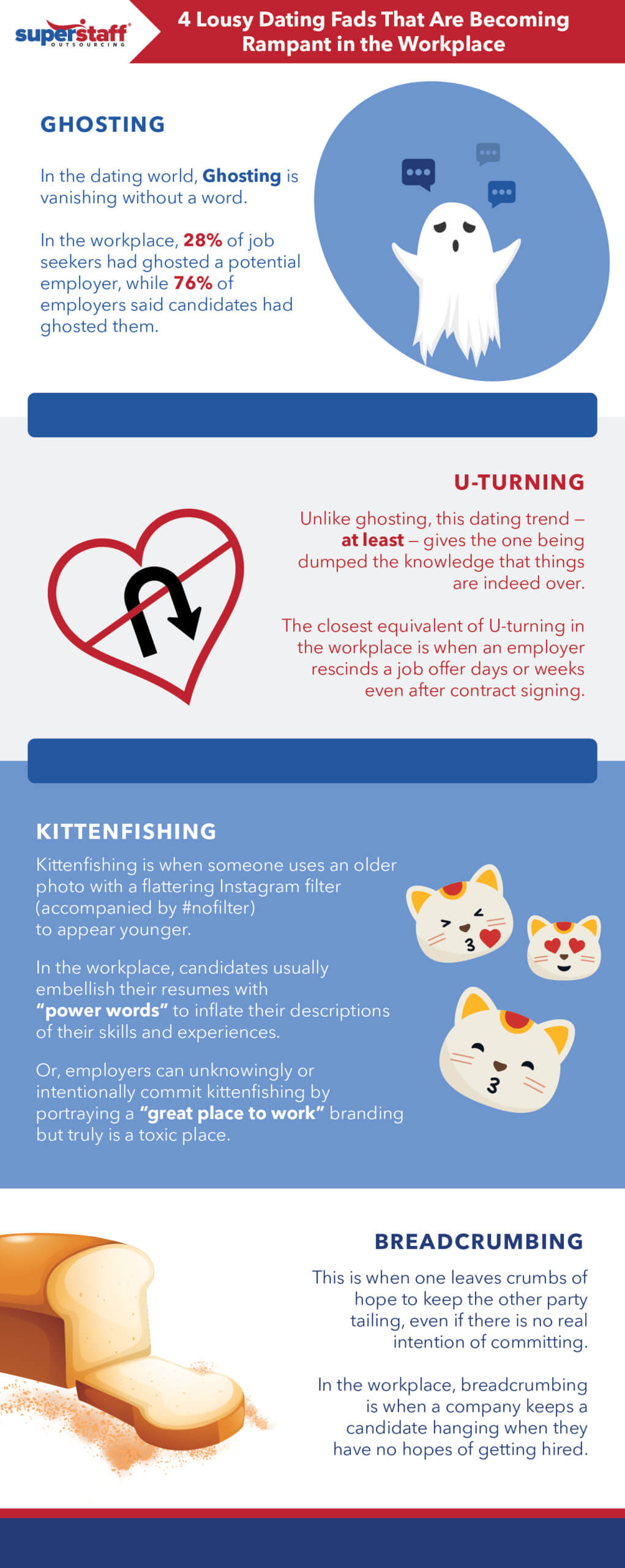
Ever got caught in a bad romance? If you’re a single adult, there’s a high chance that you have, one way or another, experienced the frustrations of modern dating.
Nowadays, finding a potential date can be done in a single swipe. Literally!
Despite all the convenience dating apps offer, none guarantees a foolproof romantic escapade. The abundance of dating apps gave birth to new dating trends that leave many confused, disenchanted, and heartbroken. Unfortunately, some of these trends have leaked into the workplace.
As more generations of professionals rely on technology for nearly everything, many appear to have found it acceptable to bring destructive dating behaviors into the professional world — whether as an employee or an employer. Let’s look at some modern trends that are making dating and job hunting less fun for many.
4 Lousy Dating Trends That Are Becoming Rampant in the Workplace

1. Ghosting
As the name suggests, ghosting is vanishing without a word. One day you can’t stop getting giddy about finally finding someone you like, and the feelings are mutual. You started entertaining the thought of taking things to the next level. Then, all of a sudden, poof! They vanish and leave you with nothing. Yes, literally nothing. No warnings. No reasons. No goodbyes.
What comes next is the painstaking process of questioning yourself. You play things repeatedly in your head, going through every little detail to figure out what happened. Did I do something wrong? Was it something I said? Did I call too much, show little care, or move too fast? But no matter how much time you spend overthinking, you will never get a definite answer.
Sadly, this aptly named scary phenomenon has become more rampant in the workplace since the pandemic. According to a report released by Indeed in February 2021, 28% of job seekers had ghosted a potential employer, while 76% of employers said candidates had ghosted them.
Despite the abundance of convenient communication channels, many still choose to ghost. Some cut communication in the early phases of the recruitment process; others wait until they get hired and then don’t show up on the first day.
And while dumping a lover via email, text, or message isn’t lauded in the dating scene, it is perfectly acceptable to turn down or back out from an employment opportunity via these means. So, why do employees still ghost?
There are plenty more fish in the sea.
Economist Nick Bunker said that the rise in the number of employees ghosting an employer suggests that candidates have a higher confidence level in their ability to find a job. With more job vacancies than applicants, employees are less hesitant to blow off a potential employer.
Additionally, just as it’s easy to find a potential partner in dating apps, job hunting has been as convenient as ever. Nowadays, anyone can apply for a job, get interviewed, and be hired digitally without having to leave the comfort of their own homes.
“It’s not me. It’s you.”
Just as any party can initiate the ghosting in the dating scene, potential employees and employers can disappear without a word. In fact, 76% of job seekers in the U.S. said potential employers had ghosted them since the pandemic. Additionally, 51% of candidates believe that more employers have been guilty of ghosting since COVID-19.
While ghosting is widespread nowadays, recruiters and employers have long been committing the act. Traditionally, it is more common for candidates to send follow-up inquiries to employers, and it wasn’t unusual for one to be met with nothing but dead silence. Even before the pandemic, many employers have been guilty of saying “don’t call us; we’ll call you” (or another version of it) to a candidate but never following through.
So, just like “The Great Resignation” and other unprecedented phenomena that had employers scratching their heads since the pandemic, the rise of employee ghosting could have a deeper underlying meaning — employees’ subtle way of rebelling against another toxic workplace practice.
Read More: Everything You Need To Know About ‘The Great Resignation’
2. U-Turning
In the dating context, U-turning is having a sudden change of heart after an intense and passionate affair. Like ghosting, a U-turn happens abruptly and without warning. One day, you’re head over heels for someone. Then, suddenly, you wake up ain’t feelin’ the vibe anymore.
Unlike ghosting, this dating trend — at least — gives the one being dumped the knowledge that things are indeed over. However, it doesn’t make it any less devastating for the receiving party. Aside from the shock factor, the aftermath makes this dating trend brutal.
Often, while in the heat of the moment, the U-turner would passionately declare their undying love, make grand plans, and even promise marriage, swaying the partner to jump head-on and plan their lives around the idea of being together for the long haul. They may relocate, move in, or share a significant purchase with their partner.
So, when one party unexpectedly takes the opposite direction, the other is not only left with a broken heart but also with the significant task of rebuilding a life.
What does U-turning look like in the workplace?
The closest equivalent of U-turning in the workplace is when an employer rescinds a job offer — a phenomenon that appears to be picking up steam lately. A few months ago, companies from nearly all sectors put their best foot forward to woo talents amid the tight labor market, promising everything from a significant raise to flexible hours.
Many employees who have accepted offers from other companies have resigned from their previous jobs and turned down other prospects. Some have even relocated to another state and even another country.
But since June 2022, multiple reports stated companies are canceling job offers, leaving recruited employees empty-handed. Citing inflation and market uncertainties as reasons, more companies, including big players like Netflix and Meta, have also started implementing a more careful hiring approach — all in a matter of weeks.
Is the fire fizzling out?
Just as anyone has the right to change their mind about their romantic partners, companies can legally pull out job offers as long as the cause is not discriminatory. But as we all know, what’s perfectly legal, isn’t always ethical — and isn’t always free of consequences. After all, it’s still the era of the employees.
While the sudden uptick in the number of companies scaling down on hiring cannot go unnoticed, the labor market remains red hot. As of the last business days of May 2022, there were still 11.3 million job vacancies in the U.S.
Read More: State of the US Labor Market in 10 Powerful Q1 Statistics
3. Kittenfishing
Kittenfishing happens when someone tweaks their online dating or social media profile to make themselves appear better. It is a downplayed version of catfishing or when someone assumes an entirely false identity. It is also not as overt. Most of us may even be guilty of committing kittenfishing more often than we realize.
Kittenfishing is when someone uses an older photo with a flattering Instagram filter (accompanied by #nofilter) to appear younger. It sometimes involves shooting a picture at an angle that would make one look taller, taking a photo behind a Ferrari parked in the street, or dogfishing, which, on its own, is another lousy dating trend.
While the consequences of kittenfishing are not as devastating as what we’ve seen on “The Tinder Swindler,” it nevertheless creates unrealistic expectations and leaves a bad taste in one’s mouth.
Spotting kittenfishing in the workplace
Job seekers and employers are equally guilty of kittenfishing. Candidates usually embellish their resumes with “power words” to inflate their descriptions of their skills and experiences. Worst, many adorn theirs with non-existent skills and experiences. According to one study, 36% of applicants have admitted to lying on their resumes.
Of course, it is not wrong for job seekers to amplify their resumes so they would stand out. In fact, it is something that every job seeker should do. The problem occurs when one sensationalizes achievements on their resume.
On the other hand, employers can unknowingly or intentionally commit kittenfishing by portraying a “great place to work” branding or making other unrealistic promises to attract candidates. Although this practice is not entirely new, it appears to have become more rampant today amid talent shortages. Consequently, it created another phenomenon called “The Great Regret.”
Nope, they don’t love the way you lie.
According to a survey by Muse, 72% of workers in the U.S. said they had experienced a shift shock or the feeling of regret after realizing that their new job or company was far from what they were led to believe during recruitment.
With the pandemic catalyzing a shift in people’s priorities, it is improbable that those experiencing “The Great Regret” will settle for less. Many are ready to resign and look for another job, costing the companies huge demerits on their attrition rates and employer branding.
Read More: How Employers Can Prevent ‘The Great Regret’ From Turning Into ‘The Great Attrition’
4. Breadcrumbing
As the term implies, breadcrumbing is when one leaves crumbs of hope to keep the other party tailing, even if there is no real intention of committing. In short, it is stringing someone along.
Breadcrumbing is similar to cookie jarring, another dating trend describing the terrible act of using someone as a backup. You’re guilty of cookie jarring if you are seeing or sending flirtatious messages to someone while you actively pursue someone else.
A fine line between sensible and bad behavior
A slight cookie jarring is acceptable in the workplace. It is just sensible for employers to screen more than one candidate and build a talent pool. Job seekers do this (and should), too.
Candidates often send out multiple applications and show up to other interviews, even when their hearts are already set on one specific company. In the workplace, it is acceptable and pays to have a fallback.
However, it is unacceptable to breadcrumb or keep a candidate hanging when they have no hopes of getting hired — especially in a labor climate that still favors employees.
Eventually, candidates will realize that they are being dragged along. And once they do, they may ghost the employer and do it sooner than some recruiters expect. A study by Robert Half found that 62% of candidates would lose interest in a job if they don’t hear from the recruiter within two weeks after the interview — but that’s not the worst potential consequence!
Ever bad mouth an ex?
Just like how a jilted lover can hold a ranting session and pour their frustrations about their ex to their friends, a dissatisfied candidate can share a bad candidate experience with their circle of friends. They can also anonymously — without holding back — let out all their grievances to thousands of readers on job boards, company review sites, and social media.
Read More: As ‘The Great Resignation’ Persists, What Should Your Employee Value Proposition Look Like in 2022?
Are you hoping for a better workplace? We can learn a thing or two from Bumble.
While the pandemic has paved the way for the rise of modern dating practices that have left many jaded, it has also made way for what appears to be a healthier and better way of seeking a potential life partner. TIME calls it intentional dating. Bumble calls it hardballing.
COVID-19 has made many realize the fragility of life and reconsider what dating should look like. According to a survey conducted by Bumble in 2021, 59% of their app users said they had become more upfront about what they wanted. Additionally, 38% said they felt more confident in saying what is and isn’t right for them in their dating lives.
These figures suggest that more people have become more transparent and straightforward with their intentions and expectations, ditching the cycle of endless swipes in pursuit of more meaningful encounters.
As cliche as it sounds, people have realized that life is too short to waste time on lame games or stay in bad relationships, a mindset that is — and should be — mirrored in the workplace.
Since COVID-19, many workers have experienced pandemic epiphanies that prompted them to desire a better, more authentic, and humane workplace. Many companies have responded to this call and have sincerely wanted to change hiring practices.
Hopefully, this positive trend continues and encourages employers and employees to aim for a more progressive workplace culture.
Building Back Better by Going Back to Basics
We all are trying to live and power through an immensely difficult period of uncertainty. And while we have less control over many things happening today, we are presented with an opportunity to rethink and reset many of our faulty beliefs, habits, and practices in the workplace and beyond.
It’s not that complicated. Let’s take the time to remember “The Golden Rule” and be mindful of the impacts of our actions on ourselves and others. Perhaps, we can have a better chance of experiencing a more fulfilling journey, romantic or otherwise.
Cheers!






